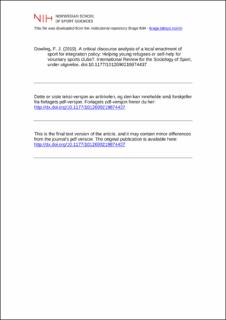| dc.contributor.author | Dowling, Fiona | |
| dc.date.accessioned | 2020-04-23T07:41:03Z | |
| dc.date.available | 2020-04-23T07:41:03Z | |
| dc.date.created | 2019-09-20T11:22:36Z | |
| dc.date.issued | 2019 | |
| dc.identifier.citation | International Review for the Sociology of Sport. 2019, under utgivelse. | en_US |
| dc.identifier.issn | 1012-6902 | |
| dc.identifier.uri | https://hdl.handle.net/11250/2652177 | |
| dc.description | I Brage finner du siste tekst-versjon av artikkelen, og den kan inneholde ubetydelige forskjeller fra forlagets pdf-versjon. Forlagets pdf-versjon finner du på journals.sagepub.com / In Brage you'll find the final text version of the article, and it may contain insignificant differences from the journal's pdf version. The definitive version is available at journals.sagepub.com. | en_US |
| dc.description.abstract | An increasing number of scholars argue that politicians’ ill-defined policies of sport for integration are difficult to realize and, paradoxically, can lead to a sense of alterity and exclusion. This paper provides a micro-analysis of the ‘slippage’ between government visions of sport for integration for refugees and the local, contextual interpretations of sport policy for inclusion. From a critical constructivist perspective, influenced by critical race theory, it examines policy enactment by asking: ‘How did sport for integration of young refugees get talked and written about in a voluntary sports club?’; ‘How did this language in use construct the practices that became locally naturalized?’; and ‘What ideologies were underpinning these realities’? Findings from the critical discourse analysis revealed that local enactments of policy for integration were mostly built upon assimilationist ideas that can exclude, rather than integrate, refugees, and did ideological work to uphold racialized hierarchies in sport. Alternative visions of integration (such as two-way processes of integration or ideas about celebrating cultural diversity) were rationally marginalized in the everyday business of the voluntary sports club, namely, competitive sport. The findings contribute to the literature that claims VSCs may be unsuitable arenas for integration initiatives aiming to provide meaningful physical activity for refugee youth. | en_US |
| dc.language.iso | eng | en_US |
| dc.subject | critical discourse analysis | en_US |
| dc.subject | racism | en_US |
| dc.subject | sport for integration | en_US |
| dc.subject | sports policy enactment | en_US |
| dc.title | A critical discourse analysis of a local enactment of sport for integration policy: Helping young refugees or self-help for voluntary sports clubs? | en_US |
| dc.type | Peer reviewed | en_US |
| dc.type | Journal article | en_US |
| dc.description.version | acceptedVersion | en_US |
| dc.source.pagenumber | 1-15 | en_US |
| dc.source.journal | International Review for the Sociology of Sport | en_US |
| dc.identifier.doi | 10.1177/1012690219874437 | |
| dc.identifier.cristin | 1727135 | |
| dc.description.localcode | Seksjon for Kultur og Samfunn / Department of Cultural and Social Studies | en_US |
| cristin.ispublished | true | |
| cristin.fulltext | postprint | |
| cristin.qualitycode | 1 | |
